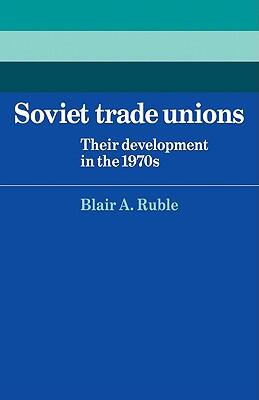
Soviet Trade Unions: Their Development in the 1970s
door
Blair A. Ruble
Nog geen beoordelingen
Romance
History
Horror
Formaat
Paperback
Pagina's
204
Taal
Engels
Gepubliceerd
Dec 3, 2009
Uitgever
Cambridge University Press
Editie
1
ISBN-10
052112445X
ISBN-13
9780521124454
Beschrijving
In the 1970s, Soviet trade unions were at a pivotal moment in their evolution, influenced by the broader socio-political landscape of the time. The author, Blair A. Ruble, meticulously examines the intricate relationship between these labor organizations and the state, highlighting how unions navigated the complexities of a communist regime focused on control and centralization. Through detailed analysis, Ruble sheds light on how trade unions both reflected and responded to the changing needs and aspirations of Soviet workers during a period marked by stagnation and discontent.
Ruble delves into the internal dynamics of trade unions, exploring how they influenced worker rights while simultaneously acting as tools for governmental policies. This duality of purpose often left unions in a precarious position, balancing the demands of workers with the expectations of the state. The examination reveals the paradox of an institution designed to represent labor interests while remaining tightly woven into the fabric of a totalitarian system.
The exploration of this topic provides valuable insights into not just the unions themselves but also the life of Soviet citizens during a transformative era. By understanding these organizations, readers gain a deeper appreciation of the complexities of worker representation and the impact of political ideology on everyday life in the Soviet Union. Ruble's scholarship invites contemplation on the legacies of such systems, making it a compelling study for anyone interested in labor history, Soviet studies, or the interplay between state and society.
Ruble delves into the internal dynamics of trade unions, exploring how they influenced worker rights while simultaneously acting as tools for governmental policies. This duality of purpose often left unions in a precarious position, balancing the demands of workers with the expectations of the state. The examination reveals the paradox of an institution designed to represent labor interests while remaining tightly woven into the fabric of a totalitarian system.
The exploration of this topic provides valuable insights into not just the unions themselves but also the life of Soviet citizens during a transformative era. By understanding these organizations, readers gain a deeper appreciation of the complexities of worker representation and the impact of political ideology on everyday life in the Soviet Union. Ruble's scholarship invites contemplation on the legacies of such systems, making it a compelling study for anyone interested in labor history, Soviet studies, or the interplay between state and society.
Recensies
Nog geen beoordelingen
Wees de eerste om dit boek te recenseren en deel je gedachten
Voeg Eerste Recensie ToeLeeslogboek
Geen leeslogboeken gevonden
Begin met het volgen van je leesvoortgang om logboeken hier te zien
Voeg je eerste leeslogboek toeNotities
Geen notities gevonden
Begin met het toevoegen van notities om ze hier te zien
Voeg je eerste notitie toeTransactielogboek
Geen transactielogboeken gevonden
Begin met het volgen van je boektransacties om logboeken hier te zien
Voeg je eerste transactielogboek toe